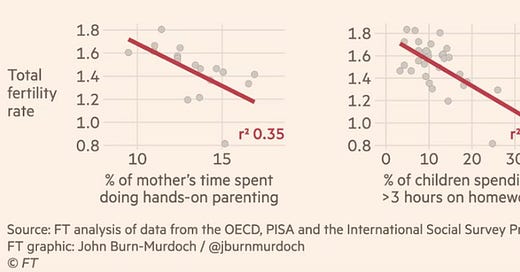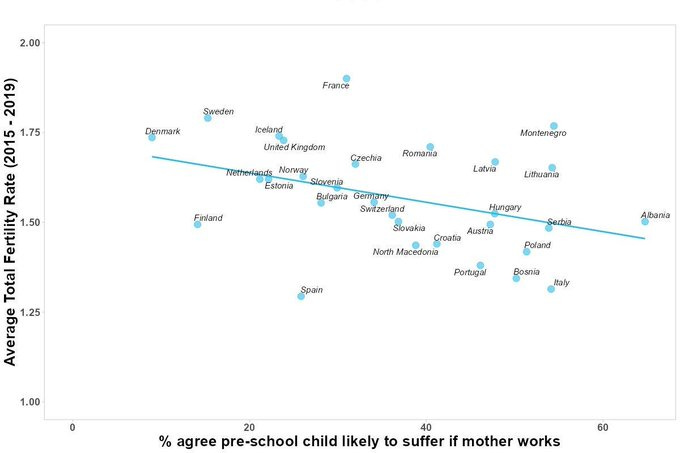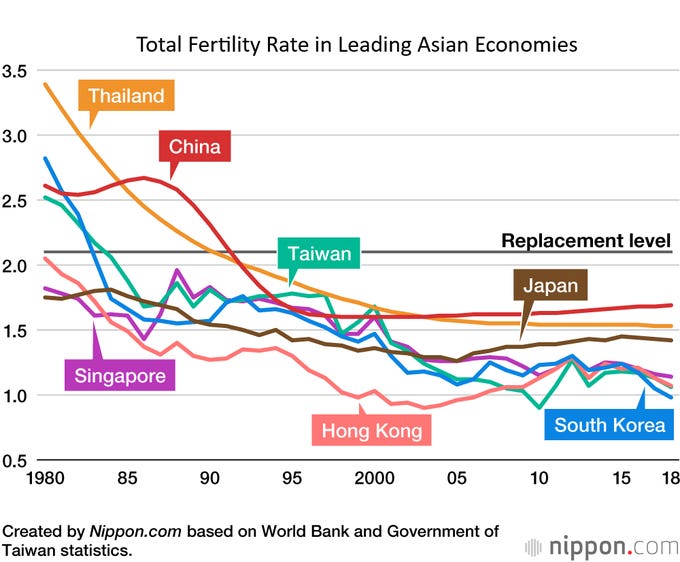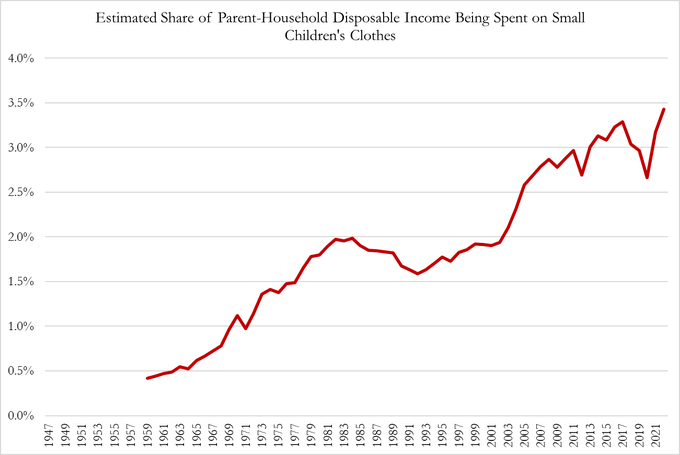High Intensity Parenting is a Real Barrier to Healthy Birthrates
Why we should worry less and have more kids
Even as birthrates are crashing, parenting has gotten a lot more demanding over time. Parents spend around twice as much time with their kids as they did 40 years ago, according to one study. Travel teams, a rare thing a generation ago, are the norm today. Growing up most of us would walk to the bus stop by ourselves. These days at school bus stops, the number of waiting parents is almost equal to the number of kids. How do they find the time for that?
It seems like it would be hard to have a lot of kids when parenting is like this. And the data bears this out.
Time intensive parenting is linked to lower fertility
Data analyst and journalist John Burn-Murdoch looked at a number of policy and cultural factors impacting fertility rates. The two most negative correlations? For OECD countries, the amount of time mothers spent on ‘hands-on parenting’ and the amount time kids spent on homework both were linked to much lower birthrates. Both of these are proxies for high-intensity parenting.
This makes sense. If raising kids is seen as an onerous task, fewer people will want to be parents at all. Those that do become parents will want a lot less children.
The best family model? Whatever works
The Boom Campaign, a pronatalist group in the UK, presented this chart finding that the belief that “a child is likely to suffer if their mother works” was linked to lower fertility rates in Europe. (TFR values are from 2015-2019; fertility is lower everywhere now.)
For traditionalists, this is tough to swallow. Surely it is beneficial for kids to have their mother stay at home with them when they are little, right? Stay-at-home moms are a cornerstone of many successful families. But so are working moms. In parenting more than almost anything else, we make the perfect the enemy of the good.
It turns out that if women think they must choose either work or having children, then a lot of them will choose only work and birthrates end up being lower. This seems robust. Policy writer Aria Babu looked at the same question for a number of additional countries and found the relationship still holds.
It is more pro-natal to welcome either option, having a full-time parent or having two working parents, with equal enthusiasm. A majority of women want to work, and many have incredible talent. If society denigrates either careerist mothers or stay-at-home moms, a lot of women will reject motherhood completely.
Mainly we need more parents. For that it helps to be very flexible about how people get there.
Tiger mothers: How is it going?
There is one group so known for intensive parenting that there is a word for it. Yale Professor Amy Chua wrote a bestselling book, Battle Hymn of the Tiger Mother that valorized the intensive parenting-style of Asian parents worldwide. Her book drew a lot of strong reactions. Some were inspired to try harder, while many parents were upset that their children would be left behind.
No doubt, the book and the mindset that inspired it meant ratcheting parenting up more than ever.
How is all that tiger parenting going? Not very well, if the goal is to keep the lights on in the long run.
Is this just a quirk within East Asian countries? No. The East Asian pattern of high investment in very few children holds around the world. In the United States, East Asian women have the lowest fertility rate of any group, even though they have the highest marriage rates of all.
A lot of pronatalist thinkers are saying the same thing: We should go easier on parenting while having more kids
Bryan Caplan
Economist Bryan Caplan notes in his book Selfish Reasons to Have More Kids that parenting should be easier than ever because of modern conveniences and our better quality of life compared to our ancestors. In theory, people should have more kids as society grows richer. Instead, we have fewer, and parenting feels harder. Why? We have placed many new requirements and expectations on ourselves that earlier parents never had. A lot of that effort isn't necessary, he says.
Caplan gives another reason not to try too hard with parenting: biology. Nature has a huge influence on how kids turn out regardless of what parents do. Adoption studies show that for all the effort that adoptive parents put into raising kids, they tend to be quite similar to their biological parents. This is liberating in a way. If our parenting matters less, we might as well have fun and not stress so much about whether someone got a little more TV than they were supposed to.
Tim Carney
Journalist Tim Carney in his book Family Unfriendly laments the ‘travel team trap’ and revels in the joy of a kind of controlled chaos where families hang out and socialize at events like church barbecues while kids run semi-wild, under the not-especially-watchful eye of their elders. The best part? Parents have a great time, everyone ends up happy and well fed, and nobody had to try very hard. Perhaps the dad manning the grill will sweat a little, but stress is low. When life is as fun as that, it’s not hard to imagine having a gaggle of kids. Carney has six and a few in his circle have ten or more.
Carney explains that parenting is a lot easier when there are thick parent networks where families back each other up. To have that, he says, it helps when one parent can step back from work to be devoted to the family full time. (For bigger families, that makes a lot of sense. Two full-time wage earners plus a bunch of kids is a harder difficulty setting than I would want, personally.)
Catherine Pakaluk
Professor Pakaluk’s book about mothers of five or more, Hannah’s Children, has some choice quotes.
“I couldn’t care less if my kids are happy. That’s their job.” – Laura, mother of 9.
“It’s funny because our culture wants to not have kids do [hard] stuff so that “they can have a childhood” but then when they don’t feel useful then they don’t know what to do. They feel depressed.” – Kim, mother of 12.
Bracing! Do you get a sense that this is a different parenting style? Yet here is the kicker: a Norwegian study of 114,500 kids found that those in big families were happier and had better mental health!
Lyman Stone
Stone looked at data on clothing spending and found something incredible. Parents are spending 7 times as much of their income on little kids’ clothes as they did at the height of the Baby Boom in 1960, even though there were a lot more kids back then! In inflation-adjusted dollars, he found, parents are spending 20x as much on kids’ clothes these days!
The lesson? We lament that parenting is so hard and expensive these days, but in a lot of ways we are doing this to ourselves.
We can aim lower in a lot of ways and things will be fine!
Marriage, religious communities, and single-family homes all make parenting easier
More Births has often emphasized the pro-natal effect of three things, marriage, religious attendance and single-family homes. What do they all have in common? They all make it so that parents don’t have to work as hard.
This weekend, my wife is away on a cross-country trip leaving me home with six kids. I am reminded why practically every culture on Earth has this weird institution called marriage. It is way easier to care for kids with two people than with one.
Religious groups are another cheat code to easier parenting. As Tim Carney wrote, the communities they offer do a lot of parenting work for you. In this world, that is no small thing.
As for a house with a yard? The data show that fertility rates are much higher in single family homes than in apartments, but why is that? Parenting is a lot less work when kids have a playroom, a yard to run around in, and a natural sound barrier with the neighbors. In a place with a yard, kids can entertain themselves in a bunch of different ways while parents can get stuff done. When the family is confined to an apartment, parents have to take a little trip every time the kids want to touch grass, which may be many times a day.






